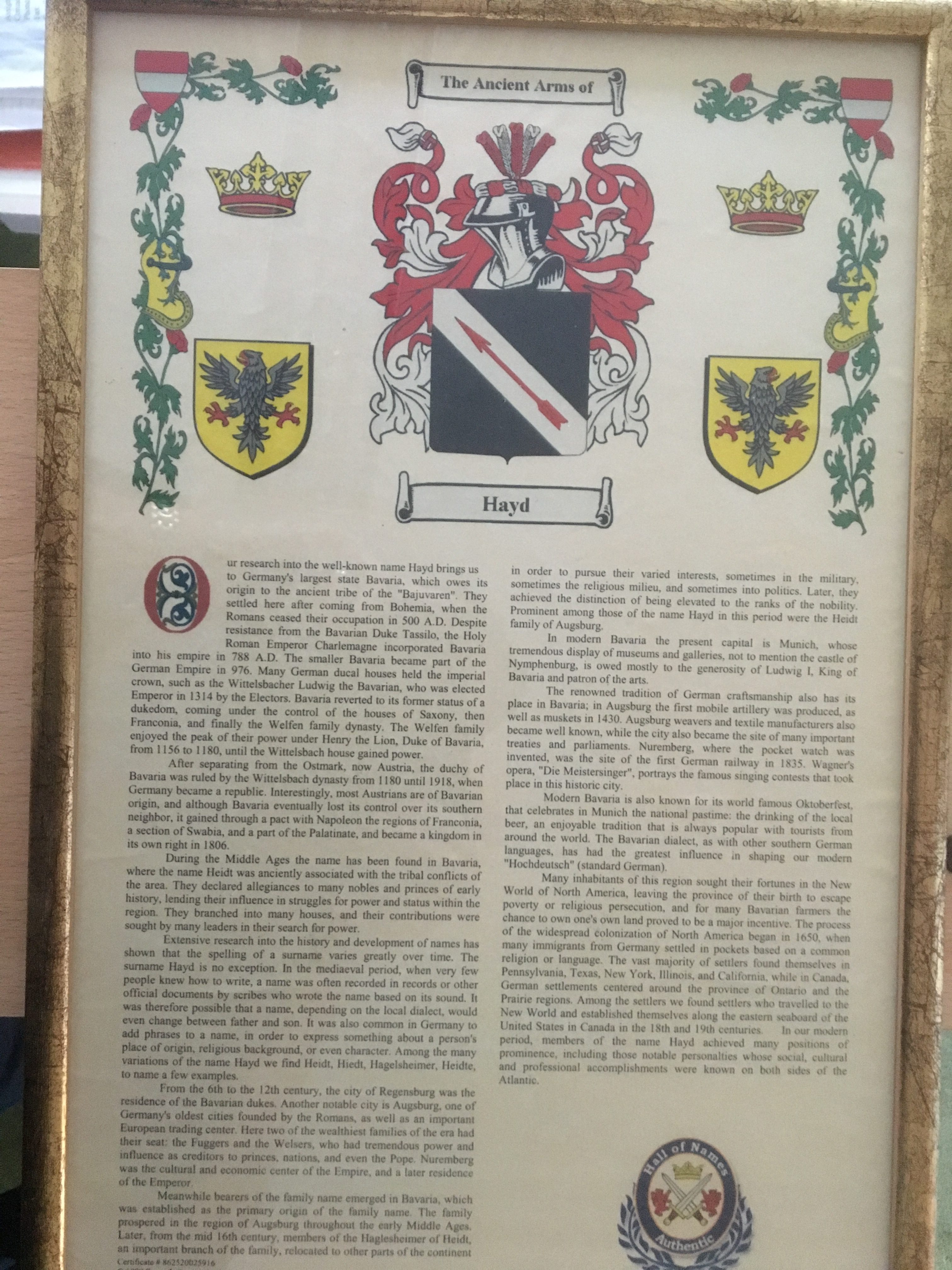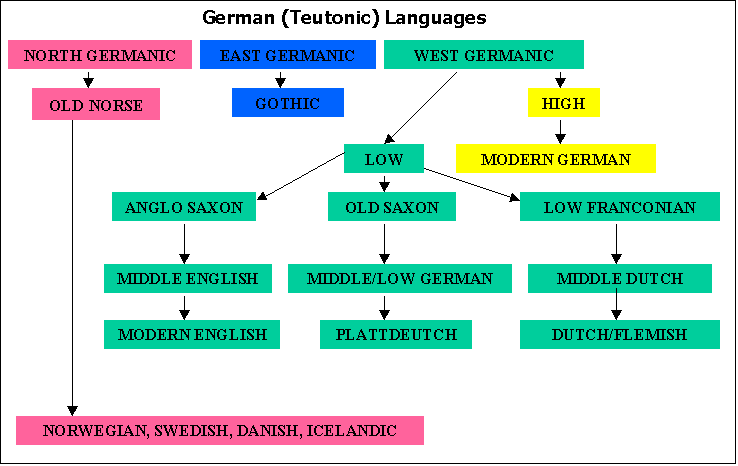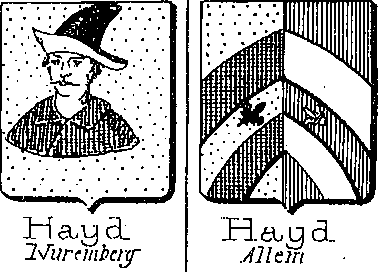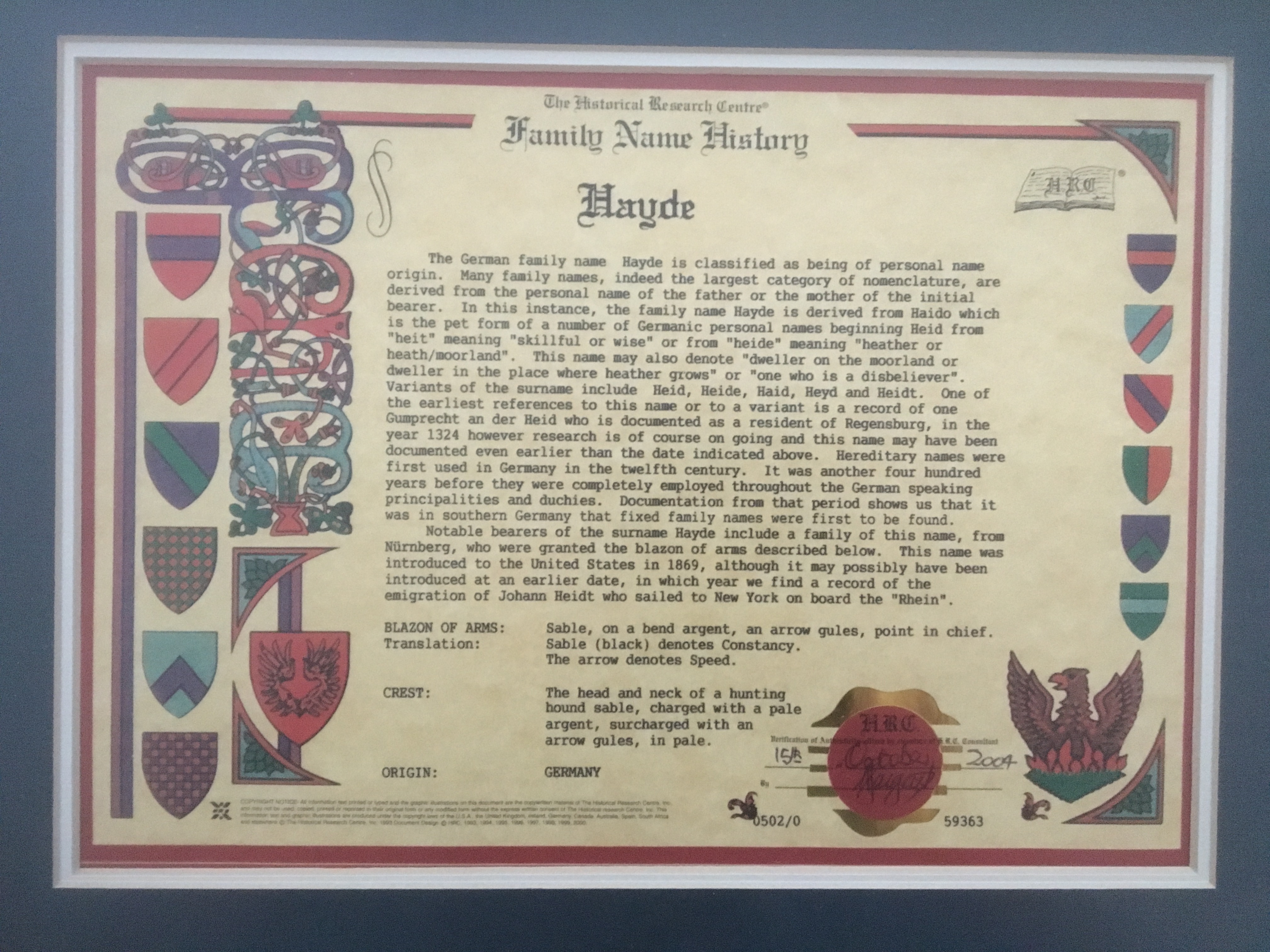Meaning of the Name
Irish sources
A Dictionary of Irish Surnames [1] has no entry for Hayde, Hade, Heide, or Haide. It only has the following:
“Hayden
1) English: Habitation name from any of the places called Hayden or Haydon.
2) Irish: Anglicized form of Gael, O hEideain and O hEidin.”
MacLysaght’s “Supplement to Irish Families” has the following entry:
“Haide
This name is also spelt Hade and Hayde. It is not an English name and is probably an Anglicised form of some Gaelic Irish surname. Richard Foley (Fiachra Eilgeach) considered that it is an abbreviation of O hEidin. This is the only opinion on the origin of the name that I have heard. I give it without comment, beyond saying that it certainly belongs to the same parts of the country as Hayden viz south Leinster and Tipperary. It is also found in Kildare, where there is a place-name Ballyhade. It is not numerous anywhere: there were 8 births registered for the name in 1866 and less than 5 in 1890.
The English family of Head, associated with Tipperary since the end of the 17th century is not, I think, to be confused with Hade.”
“Head(e)
This is occasionally a surname of the nickname type, but usually it is a locative name denoting a dweller at the head of a river. It appears as a principal name in the 1659 census in Meath and Tipperary and in that century was of some note in Waterford and Cork. Though of English origin, families of this name were largely Catholic and transplantation as papists under Cromwell accounts for their presence today in east Galway. Reference in 17th century documents to Ballyhead in Kildare (now Ballyhade) have no relation to the surname Head.”
Ballyhade is 2 kms north of Burton Hall in County Carlow.
A book called “Sloinnte Gaedheal agus Gall” by Patrick Wolfe pre-dates McLysaght by some 50 years and forms the standard reference for many researchers into the origins of Irish names. It however has no references for Hade, Haide, Hayde, Head or Heade. This implies that the name does not have a long or extensive Irish history.
German sources
Surnames or family names did not generally come into use in Germany until about the 1100s and then only because it was necessary in the developing social system to identify from one another several persons of the same given name in a locality [2]. Surnames were generally developed from:
- A derivation of the father’s name. This was particularly common in the North of Germany.
- Occupational names.
- Locality.
- Personal physical features.
- Family crests or emblems.
The surnames based upon terrain features or place names had at first been preceded by the preposition von but in time this was dropped in most of Germany by all but the nobility. Nevertheless, some people, especially in Switzerland and along the Netherlands border, retained the von with no pretensions of nobility.
In researching German-Anglo names it is important to realise that English speakers sometimes wrote German names phonetically. For example, they sometimes spelt the sound represented in German by ie as ee or ae. Thus Kiefer became Keefer, Rieser became Reeser etc.
A book called German-American Names states that the names Hayd, Hayde, Heid, Heide, and Heidt come from the word Heath [3]. In German the word Heide denotes a dry Heath.
The word Heath is defined in the Concise Oxford Dictionary as:
“open flat waste tract of land, especially if covered with shrubs”
Thus the name Hayde could be a derivation of the German word for Heath.
A book called Teutonic Name-Systems applied to the Family Names of France, England and Germany [4] is less conclusive. It refers to Old German names ending in Heid or Hait (Modern German equivalent Heit, and English equivalent Hood) as being found in many ancient names, particularly among the West Franks in the 8th and 9th centuries, i.e. names such as Adalheid, meaning noble-hood. However when the name was used as a prefix then it becomes more difficult to interpret. The book summarised the linkages of the names as follows:
Simple Forms
Old German (8th century): Haito, Haido, Haida, Eid.
English: Height, Hayday, Ade, Adie.
Modern German: Haid, Heydt.
French: Aide.
Phonetic Ending
Old German (8th century): Heidin.
English: Haydon.
Modern German: Heyden, Haydn.
French: Adin.
It appears therefore that the names Hayden, Haydon, Haydn have quite different origins to that of Hayde, Haid, Heide etc.
The names with the phonetic endings are much more prolific than the shorter name and I have ignored these in my research.
There is a town called Heide at the northern tip of Germany by the border with Denmark. As there does not appear to be any historical links by any Hayde to this part of Germany, I have assumed that this town was named after the terrain rather than having any connection to the name Hayde.
A diagram of the close kinship between German and other modern languages is as follows.
In a publication on family crests I found the following:
Most families who have had their name taken from emblems on shields were from noble blood or monied classes. Nothing I have come across leads me to believe that historically we were either of these. The family of hatmakers from Nuertingen (Tree #13) could, for example, have been responsible for designing the crest on the left.
I am not sure of the origin of the crest on the right. It is probably an abbreviation for Allemagne, the French word for Germany.
Commercial vendors of family crests generally use the Hayden crest and drop the n. One exception I have found [5] showed the following crest and narrative referring to the Bavarian origins of the name as can be seen below:
 Another commercial publication used Hayde as can be seen below:
Another commercial publication used Hayde as can be seen below:
I have read several books on the composition of crests however I have not been able to determine what the various parts of these crests stands for or means.
[1] By Patrick Hanks and Flavia Hodges and published by Oxford
[2] How to Trace your German Ancestors by Owen Mutzelburg
[3] By George F Jones published in 1990
[4] By Robert Ferguson published in 1864
[5] Produced by Swyrich Corporation, USA


